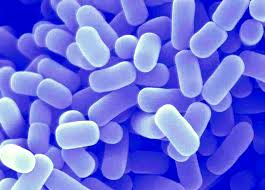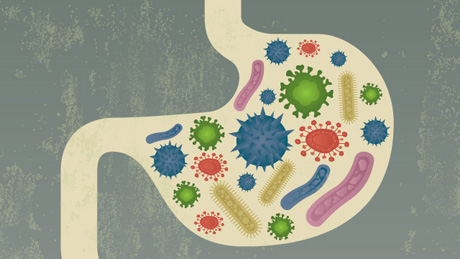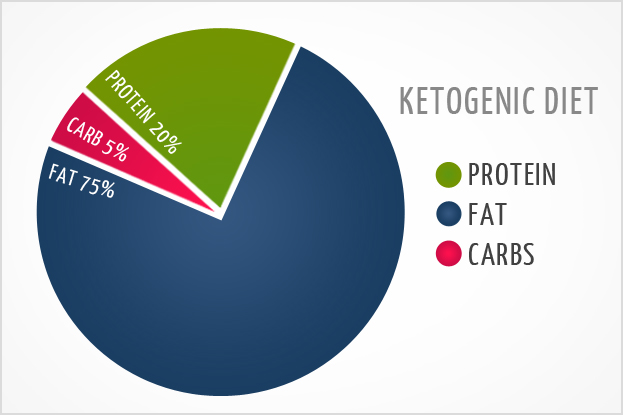I used to walk around ruminating, struggling with inner turmoil and nervousness all the time.
It never went away.
It was impossible to shake.
It wore me down and ruined the quality of my life.
There’s no doubt that fear and vigilance are helpful when you’re faced with an actual threat.
But an unnecessarily high state of worry and arousal when there is nothing threatening you? That's a nightmare.
It doesn’t have to be that way though.
If you have chronic anxiety, there are ways to manage and reverse it, like I have.
And psychobiotics are one way to do that.
Psychobiotics are probiotics and prebiotics that can improve your mental health by changing the mixture of bacteria in your gut (46-47).
It is estimated that 100 trillion bacteria, and 500 to 1,000 species of bacteria, live in the human gut. These gut bacteria, collectively known as the gut microbiome, help with digestion. But an increasing amount of research suggests that they also communicate with your brain through the microbiome-gut-brain axis, affecting your thoughts, feelings and behaviour (48-49).
A dysfunctional gut microbiome has been linked to a number of mental health problems and psychiatric conditions, including anxiety.
In fact, anxiety and gut health are very tightly linked.
Research shows that people who have digestive disorders are more likely to have anxiety, and those with anxiety have higher rates of gastrointestinal disease (50-52).
And studies show that when digestive disorders improve, anxiety improves as well (53).
Unfortunately, a lot of people have poor gut health today because of the widespread use of antibiotics, medications, herbicides, stress, infections, poor diet, etc.
But don’t worry. You can improve your gut health and anxiety at the same time with the use of psychobiotics.
Studies show that psychobiotics can improve anxiety by (54-55):
Producing neurotransmitters, such as GABA and serotonin
Reducing stress hormone levels
Reducing inflammation, one of the major underlying causes of mental illness
Crowding out pathogenic bacteria
Increasing nutrient production and absorption
Here are the nine best psychobiotics that have been shown in human and animal studies to decrease stress and help treat anxiety disorders.
They are truly the best probiotics for anxiety.
1. Lactobacillus rhamnosus
Lactobacillus rhamnosus is a bacterium found in the human gut. It is one of the most popular probiotic species found in supplements.
Preliminary research suggests that supplementing with lactobacillus rhamnosus can lower anxiety in humans (3).
GABA is the main inhibitory and relaxing neurotransmitter in the central nervous system, and studies suggest that lactobacillus rhamnosus may reduce anxiety by changing the expression of GABA receptors (1-2, 4).
In one study, researchers gave lactobacillus rhamnosus to mice, and it reduced their anxiety-like behaviours. But when researchers removed part of their vagus nerve, lactobacillus rhamnosus did not reduce their anxiety, suggesting that psychobiotics communicate with the brain and improve mental health through the vagus nerve (1-2).
“The mice [given lactobacillus rhamnosus] were more chilled out.”
Other studies have found that lactobacillus rhamnosus decreases stress-induced anxiety-like behaviour, and researchers have concluded that it can protect against anxiety (5, 7).
Lactobacillus rhamnosus has also been shown to reduce obsessive-compulsive disorder (OCD)-like behaviour in mice. In fact, researchers found it was just as effective as fluoxetine, an SSRI antidepressant commonly used to treat OCD (6).
So if you struggle with OCD or obsessive-compulsive tendencies, it’s worth trying this psychobiotic.
Lactobacillus rhamnosus can be found in some yogurt and dairy products, such as fermented and unpasteurized milk and semi-hard cheese. But I typically don’t recommend eating these foods until you are healthy enough to tolerate them.
2. Bifidobacterium longum
Bifidobacterium longum is another bacterium present in the human gut. It is often added to food as it can help prevent the growth of pathogenic organisms.
I previously wrote about how it’s been proven to help treat depression.
But it can also reduce anxiety.
Researchers have concluded that bifidobacterium longum can reduce cortisol and alleviate psychological distress in humans (including obsessions, compulsions, paranoia, anxiety) (28-30).
Lots of animal research also shows that bifidobacterium longum can significantly reduce anxiety-like behaviour (31-34).
One study found that a chronic infection in mice increased inflammation and caused anxiety-like behaviour, but bifidobacterium longum reduced anxiety and normalized behaviour (35-36).
Researchers have even figured out that it works by acting through the vagus nerve (27).
3. Lactobacillus plantarum
Lactobacillus plantarum is another probiotic species that can reduce anxiety.
In one study, researchers gave lactobacillus plantarum to patients with irritable bowel syndrome and it significantly reduced their anxiety and improved their quality of life (8).
Animal studies also show that lactobacillus plantarum can cause positive changes in emotional behaviours and significantly reduce anxiety-like behaviours. It does this by increasing dopamine and serotonin, lowering stress hormone levels, and reducing inflammation (9-11).
As a result, researchers have concluded that lactobacillus plantarum has psychotropic properties without physical side effects, and has great potential for treating neuropsychiatric disorders, including anxiety (9-11).
Lactobacillus plantarum is also commonly found in many fermented vegetables including sauerkraut, pickles, brined olives, kimchi.
4. Lactobacillus helveticus
Lactobacillus helveticus is a probiotic that has been shown to reduce cortisol and have anti-anxiety effects in humans (37, 39, 44).
One study found that it can even reduce paranoid and obsessive-compulsive thoughts (38).
Animal research shows that a Western-style diet can negatively change the gut microbiome, increase brain inflammation, and contribute to anxiety. But lactobacillus helveticus can protect against this, reducing both neuroinflammation and anxiety (40-42).
One study even found that lactobacillus helveticus works better than citalopram, a common SSRI antidepressant, at reducing anxiety-like behaviour in rats. It also reduced their stress hormone levels and increased their serotonin levels (43).
Lactobacillus helveticus is also commonly found in American Swiss cheese and Emmental cheese, and sometimes other cheeses, such as Cheddar, Parmesan, Romano, provolone, and mozzarella.
If you’re healthy enough to tolerate cheese, you could try adding some of these cheeses into your diet.
5. Lactobacillus reuteri
Lactobacillus reuteri is a bacterium with anti-inflammatory effects that scientists first discovered in the 1980s.
It is usually found in the human gut. However, not all humans have it, and some people simply have very low levels of it. Therefore, you may need to supplement with it to introduce and maintain high levels of it.
Research shows that Lactobacillus reuteri can reduce anxiety-like behaviours in animals by reducing stress hormone levels and altering the expression of GABA receptors (13-14).
And one study found that the absence of lactobacillus reuteri causes social deficits in animals.
“We found that treatment with this single bacterial strain was able to rescue their social behavior.”
By adding it back in to the guts of the animals, the researchers were able to reverse some of their behavioural deficits, which were similar to symptoms of social anxiety and autism in humans (15-16).
Therefore, lactobacillus reuteri is definitely the psychobiotic worth trying if you struggle with social anxiety or symptoms of autism.
It's also found in breast milk, and some meat and dairy products.
6. Lactobacillus casei
Lactobacillus casei is another bacterium found in the human gut. It has antioxidant and anti-inflammatory effects.
In one double-blind, placebo-controlled trial, patients with chronic fatigue syndrome and digestive problems took Lactobacillus casei as a daily supplement for two months. At the end of the study, they had a significant decrease in their anxiety symptoms (17-19).
So this is a good psychobiotic to try if you struggle with a mixture of fatigue, digestive problems and anxiety.
Lactobacillus casei is the dominant species in naturally fermented Sicilian green olives, and can also be found in other fermented vegetables and dairy products.
7. Lactobacillus fermentum
Lactobacillus fermentum is another species that is part of the human microbiome and commonly found in fermented vegetables.
It hasn’t been studied as much as other lactobacillus probiotic species.
But there still is some evidence that is may be able to help treat anxiety, especially if you have a long history of antibiotic treatment.
Research shows that antibiotics can trigger anxiety in animals by disturbing the microbiome.
But by giving animals lactobacillus fermentum, researchers can reduce the inflammation and reverse the psychological problems brought on by antibiotics, including anxiety-like behaviour (12).
So if you’ve taken a lot of antibiotics over the years, or noticed that your anxiety got worse after taking a course of antibiotics, taking a psychobiotic supplement with lactobacillus fermentum is worth a try.
8. Bifidobacterium breve
Bifidobacterium breve is a beneficial bacterium found in human breast milk and the human gut. The amount in your gut declines as you get older (20).
Research shows that bifidobacterium breve can reduce anxiety-like behaviour in animals (21).
Anxious animals also perform better on cognitive tests after being given it (22).
This makes bifidobacterium breve a great psychobiotic option if your anxiety impairs your cognition and interferes with your ability to complete tasks.
Bifidobacterium breve can be found naturally in some fermented foods.
9. Galacto-oligosaccharides
Not all psychobiotics are simply probiotics.
Psychobiotics can also include “prebiotics,” which are non-digestible soluble fibres that stimulate the growth of good gut bacteria, and therefore improve mental health and reduce anxiety.
Galacto-oligosaccharides (GOS) are a type of prebiotic that have been shown to do just that.
In one study, GOS significantly decreased the secretion of cortisol, and participants paid more attention to positive information rather than negative information (23).
People who are anxious tend to have high levels of cortisol and often get caught up in negative thinking. So this study suggests that GOS has anti-anxiety effects.
Other research has demonstrated that people with irritable bowel syndrome (IBS) often have anxiety because of the lack of microbial diversity in their gut. However, when IBS sufferers supplement with a prebiotic mixture containing GOS, it significantly reduces their anxiety and improves the quality of their life (24-26).
What Psychobiotic Should You Take?
Ideally, you should buy and try one psychobiotic at a time to figure out how you respond to each one.
That's what I did over the span of several years.
I would buy and try one probiotic, take it for at least one month, and then monitor how I felt during that time.
Sometimes I would stop taking it if I felt worse.
I was my own guinea pig and tested and experimented with so many different probiotic supplements to find the ones that helped.
I usually recommend people follow the same process because many people like myself often experience a bad reaction to one, but a good reaction to another.
But I understand doing that can be time-consuming and tedious. Plus, clinical studies often demonstrate that probiotic mixtures with multiple bacteria are better at improving the diversity of gut bacteria than individual ones (45).
So, to make it easier for you, I’ve now created my own psychobiotic supplement, called Optimal Biotics.
I created it because I want to give my readers the very best psychobiotic supplement so that they can experience superior results.
I have found that many psychobiotic supplements on the market fall short and even cause side effects.
But Optimal Biotics doesn't, and it contains the 8 most well-researched and beneficial probiotic strains for your mental health.
I also recommend adding fermented foods into your diet and see how that goes. Fermented foods contain many strains of bacteria that have not been documented in the scientific literature. That said, the downside is that the bacteria in fermented foods will vary depending on the batch, and there is sometimes the risk of them containing pathogenic bacteria.
Here are some other steps you can take to increase the good bacteria in your gut.
And this anti-anxiety supplement also includes several other natural compounds that have helped me manage my anxiety over the years. It can help reduce stress and anxiety while you work to improve your gut health.
Conclusion
The microbiome and psychobiotics are at the cutting-edge of neuroscience and mental health research and treatment. It hasn’t been that long since researchers first discovered that there is a gut-brain connection.
When I first found out about it several years ago, I started consuming psychobiotics, and they have definitely helped me chronic anxiety over the years.
But it’s important to point out that psychobiotics alone were never enough.
I also had to make changes to my diet, take key supplements, improve thyroid health, and overcome trauma. There really is no quick fix or magic bullet.
Yet for some people, psychobiotics can be life changing, especially if you have digestive issues alongside your anxiety and worry.
Overall, I think they are absolutely worth a try.
I hope this article helps you, and please share it with anyone you think might benefit from it.
Enjoy This Article? You Might Also Like My FREE Food Guide for Optimal Brain and Mental Health!
References:
(1) https://www.ncbi.nlm.nih.gov/pmc/articles/PMC4370913/
(2) https://www.ncbi.nlm.nih.gov/pubmed/21876150/
(3) https://www.ncbi.nlm.nih.gov/pubmed/25879690
(4) https://www.ncbi.nlm.nih.gov/pmc/articles/PMC4934620/
(5) https://www.ncbi.nlm.nih.gov/pmc/articles/PMC5225647/
(6) http://www.ncbi.nlm.nih.gov/pubmed/24257436
(7) https://www.ncbi.nlm.nih.gov/pmc/articles/PMC4200314/
(8) https://www.ncbi.nlm.nih.gov/pubmed/25024629
(9) http://www.ncbi.nlm.nih.gov/pubmed/26620542
(10) http://www.ncbi.nlm.nih.gov/pubmed/26522841
(11) https://www.sciencedaily.com/releases/2016/11/161121160038.htm
(12) http://www.ncbi.nlm.nih.gov/pubmed/25869281
(13) https://www.ncbi.nlm.nih.gov/pmc/articles/PMC3754198/
(14) http://onlinelibrary.wiley.com/doi/10.1111/j.1365-2982.2010.01664.x/full#b28
(15) https://www.sciencedaily.com/releases/2016/06/160616140723.htm
(16) http://www.cell.com/cell/fulltext/S0092-8674(16)30730-9
(17) https://www.ncbi.nlm.nih.gov/pmc/articles/PMC2664325/
(18) https://gutpathogens.biomedcentral.com/articles/10.1186/1757-4749-1-6
(19) http://www.ncbi.nlm.nih.gov/pubmed/19338686/
(20) http://journal.frontiersin.org/article/10.3389/fmicb.2016.01204/full
(21) https://www.ncbi.nlm.nih.gov/pubmed/25251188
(22) https://www.ncbi.nlm.nih.gov/pubmed/25794930
(23) https://www.ncbi.nlm.nih.gov/pmc/articles/PMC4410136/
(24) https://www.ncbi.nlm.nih.gov/pmc/articles/PMC4370913/
(25) http://onlinelibrary.wiley.com/doi/10.1111/j.1365-2036.2008.03911.x/abstract
(26) http://www.ncbi.nlm.nih.gov/pubmed/19053980
(27) https://www.ncbi.nlm.nih.gov/pmc/articles/PMC3413724/
(28) https://www.ncbi.nlm.nih.gov/pubmed/20974015/
(29) http://www.tandfonline.com/doi/abs/10.4161/gmic.2.4.16108
(30) https://www.ncbi.nlm.nih.gov/pubmed/21983070
(31) https://www.ncbi.nlm.nih.gov/pubmed/21683077
(32) https://www.ncbi.nlm.nih.gov/pmc/articles/PMC4934620/
(33) https://www.ncbi.nlm.nih.gov/pubmed/25251188
(34) https://www.ncbi.nlm.nih.gov/pubmed/25794930
(35) https://www.ncbi.nlm.nih.gov/pubmed/20600016
(36) https://www.ncbi.nlm.nih.gov/pubmed/21988661
(37) https://www.ncbi.nlm.nih.gov/pubmed/20974015/
(38) http://www.tandfonline.com/doi/abs/10.4161/gmic.2.4.16108
(39) https://www.ncbi.nlm.nih.gov/pmc/articles/PMC4934620/
(40) https://www.ncbi.nlm.nih.gov/pubmed/23566632
(41) http://www.ncbi.nlm.nih.gov/pubmed/26408987
(42) https://www.ncbi.nlm.nih.gov/pubmed/24554471
(43) https://www.ncbi.nlm.nih.gov/pubmed/26408987
(44) https://www.ncbi.nlm.nih.gov/pubmed/23181058
(45) http://www.ncbi.nlm.nih.gov/pmc/articles/PMC4906699/
(46) https://www.ncbi.nlm.nih.gov/pubmed/23759244
(47) https://www.ncbi.nlm.nih.gov/pmc/articles/PMC5102282/
(48) https://www.ncbi.nlm.nih.gov/pmc/articles/PMC4228144//
(49) http://www.ncbi.nlm.nih.gov/pmc/articles/PMC4937966/
(50) https://www.ncbi.nlm.nih.gov/pubmed/?term=18819774
(51) https://www.ncbi.nlm.nih.gov/pubmed/219080555
(52) https://www.ncbi.nlm.nih.gov/pubmed/21908055
(53) http://www.ashdin.com/journals/JEM/235910/
(54) https://www.ncbi.nlm.nih.gov/pubmed/27632908































